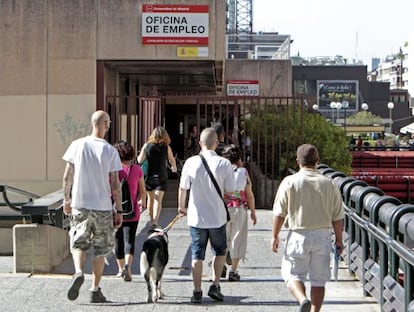Crisis sees rise in number of youngsters out of work and not studying
Spain remains at the top of the list for so-called “ninis,” according to latest OECD education report


One in every four young Spaniards is a “nini” – a nickname in Spanish for someone who is neither working nor studying (ni trabaja, ni estudia). According to a new education report from the Organisation for Economic Co-operation and Development (OECD), Spain has the highest number of ninis aged between 15 and 29. The level is also five points higher than the OECD average, on a par with Chile, Ireland, Turkey, Italy and Mexico. The number of university graduates in the country out of work, or who are no longer studying, has risen 10 points in four years, to 23 percent, according to the OECD’s Education at a Glance 2014 report.
The study, which analyzes data from 2012, shows that the number of students with secondary education who abandon their studies and do not head into work has been growing since 2008 in the majority of OECD countries. It recommends all countries revise orientation and education programs to ensure that there are no “dead ends” for young people.
Nearly 1.7 million young Spaniards out of a total of 7.6 million will remain without work before reaching the age of 30, according to Eurostat data. In Spain, where school-leaver rates and low grades are among the highest in Europe, the percentage of ninis has grown at all levels of education compared to OECD reports released in 2012 and 2013.
The report recommends revision of orientation and education programs to avoid “dead ends” for young people
The problem is greatest among those who have not completed secondary school education (31 percent, with an increase of two points in two years), followed by those who completed secondary school (20 percent).
The majority of these youngsters are unemployed in Spain (19 percent compared to an OECD average of six percent). The report attributes this to the high amount of temporary contracts usually offered to young people in Spain, which are interspersed with periods of unemployment.
“We still have a very sick labor market,” explains José Dalado, an expert in labor law and lecturer at the European University in Florence. “Five-day contracts are the norm, followed by weeks out of work.” The study shows, in fact, that more than half of young people in Spain aged between 15 and 29 who have finished their studies and are working part time want to work more hours.
We still have a very sick labor market. Five-day contracts are the norm” Labor law expert José Dalado
Florentino Felgueroso, a researcher at the Foundation of Applied Economic Studies (FEDEA), explains that the Spanish administration has not made sufficient efforts to ensure that youngsters with a low level of education return to the education system. “We have wasted a lot of time in this period of crisis,” he says. “The education system should have taken advantage of it to better train those who were left behind because of the real estate boom.”
Felgueroso also says, however, that the number of ninis reached its peak in 2012, and that this percentage will come down – albeit not because of the active youth employment measures introduced by the government. The main reasons, he explains, are the fall in the youth population (with nearly 600,000 fewer youngsters since 2011), and the crisis itself. “The younger ones have seen that the future is complicated and have decided to spend more time at school and getting training.”
Tu suscripción se está usando en otro dispositivo
¿Quieres añadir otro usuario a tu suscripción?
Si continúas leyendo en este dispositivo, no se podrá leer en el otro.
FlechaTu suscripción se está usando en otro dispositivo y solo puedes acceder a EL PAÍS desde un dispositivo a la vez.
Si quieres compartir tu cuenta, cambia tu suscripción a la modalidad Premium, así podrás añadir otro usuario. Cada uno accederá con su propia cuenta de email, lo que os permitirá personalizar vuestra experiencia en EL PAÍS.
En el caso de no saber quién está usando tu cuenta, te recomendamos cambiar tu contraseña aquí.
Si decides continuar compartiendo tu cuenta, este mensaje se mostrará en tu dispositivo y en el de la otra persona que está usando tu cuenta de forma indefinida, afectando a tu experiencia de lectura. Puedes consultar aquí los términos y condiciones de la suscripción digital.







































